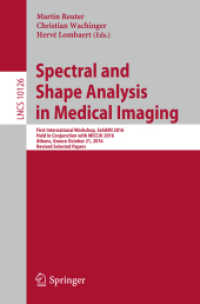- ホーム
- > 洋書
- > 英文書
- > Science / Mathematics
Full Description
This book provides a multi-level introduction to Bayesian reasoning (as opposed to "conventional statistics") and its applications to data analysis. The basic ideas of this "new" approach to the quantification of uncertainty are presented using examples from research and everyday life. Applications covered include: parametric inference; combination of results; treatment of uncertainty due to systematic errors and background; comparison of hypotheses; unfolding of experimental distributions; upper/lower bounds in frontier-type measurements. Approximate methods for routine use are derived and are shown often to coincide — under well-defined assumptions! — with "standard" methods, which can therefore be seen as special cases of the more general Bayesian methods. In dealing with uncertainty in measurements, modern metrological ideas are utilized, including the ISO classification of uncertainty into type A and type B. These are shown to fit well into the Bayesian framework.
Contents
Critical review and outline of the Bayesian alternative: uncertainty in physics and the usual methods of handling it; a probabilistic theory of measurement uncertainty. A Bayesian primer: subjective probability and Bayes' theorem; probability distributions (a concise reminder); Bayesian inference of continuous quantities; Gaussian likelihood; counting experiments; bypassing Bayes' theorem for routine applications; Bayesian unfolding. Further comments, examples and applications: miscellanea on general issues in probability and inference; combination of experimental results - a closer look; asymmetric uncertainties and nonlinear propagation; which priors for frontier physics? Concluding matter: conclusions and bibliography.







